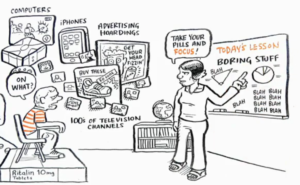
The other students in my cohort will be sick of me referencing Sir Ken Robinson and his opinions and principles of education by the time our program is complete. Still, I honestly believe that he is our ‘saviour’ and ‘prophet’ to how we should be reforming today’s education system. Besides my wife, I credit Sir Robinson’s Tedtalks as being the biggest inspirations for becoming a teacher. I have been in some form of education my whole life and have observed so many variable methods of teaching. Some motivated me and made me flourish. While others made me disengaged and disinterested in the subject we were learning. In those classes, I found myself just “jumping through the hoops to pass,” I would say it is was a combination of the subject matter and how the teacher delivered it. Two of the main components of learning: the subject matter and the educator.
I stumbled upon Sir Ken Robinson in my second year of university and knew he’d be inspirational for me for the rest of my life. At that point, I didn’t know I wanted to be a teacher yet, but his methods were relatable to how I would coach, raise my future children, treat my own education, and unknowingly, be the catalyst to becoming a teacher.
The times have changed. It is no longer true that if you work hard, get good grades, go to university, and there will be a good-paying job waiting for you. Sir Robinson doesn’t discredit this educational track entirely, but he admits that degrees don’t make guarantees. Hell, I’m on my third degree and yet to have a job in what I’ve studied in university, fingers crossed I get this one right.
“The current system was designed and conceived for a different age… for the industrial revolution… we’ve evolved past that, but our means of educating has not.” Sir Robinson says in his video Changing Education Paradigms. As up-and-coming teachers, we need to shift this paradigm from one of standardization and conformity to that of one that models divergent thinking, creativity, collaboration and lateral thinking. We need to adapt and formulate a practice that doesn’t just praise and reward academic ability.
In no way does he think this is an easy process, that it will take the ‘right’ type of teachers to do so because “our children are living in the most intensely stimulating period in the history of the earth.” We can’t expect the standard “boring stuff of school” to stimulate them; we have to find ways to “wake them up to what is inside of themselves,” through adopting multiliteracies that engage a variety of students with a variety of interests. This is something standardized testing and industrialized education don’t accommodate.
I agree with Sir Ken Robinson that we have to think differently about human capacity and each student’s individuality and reform the habits of our institutions. It is upon us to revise and focus on teaching the students, not just the curriculum.
Leave a Reply
You must be logged in to post a comment.